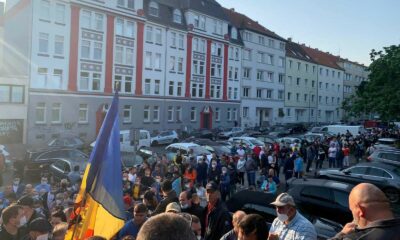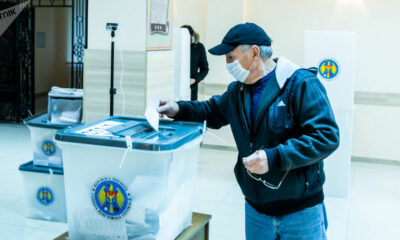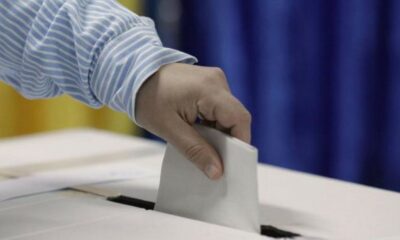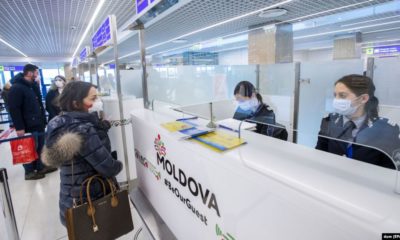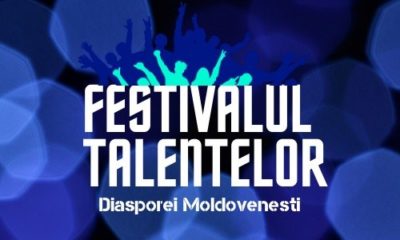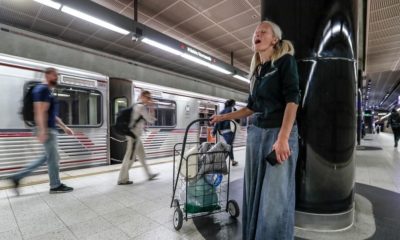Diaspora
Stories from diaspora/ Carolina Sclifos: “No matter how far away you are from home, if you are willing to contribute, you will find your own way to do it.”
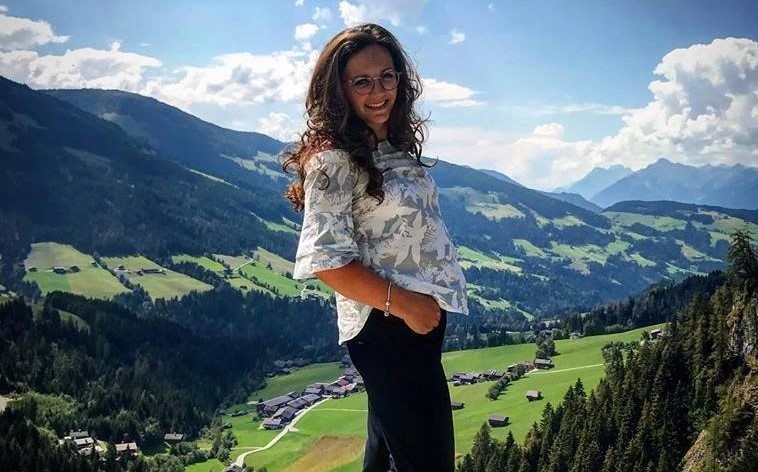
She calls herself a global citizen, being involved in international projects and aspiring to restyle this world. Her next dream – working in the UN. Her name is Carolina Sclifos – the protagonist of the story from diaspora for this week.
About her beginnings
Carolina was only 12 or 13 years old when she started to be involved in extracurricular activities. It happened in Criuleni, the city in the Republic of Moldova where she is from. While dreaming of having the power to change her homeland for the better, Carolina was participating in volunteering activities such as debates on wide interest topics with local authorities or youth and community development projects.
Her weekends were scheduled for attending trainings, workshops and meetings at the Resource Centre for Youth she was working at, whereas her holidays were planned with projects and volunteering activities. This is where Carolina got her enthusiasm to be active and to inspire others for doing more. “All that time I had wonderful people next to me who contributed to my formation and development. Being enormously grateful to them, I consider it my own duty to contribute to the development of other young people, to tell them about the experiences I had, and to encourage their participation in their own communities,” says Carolina.
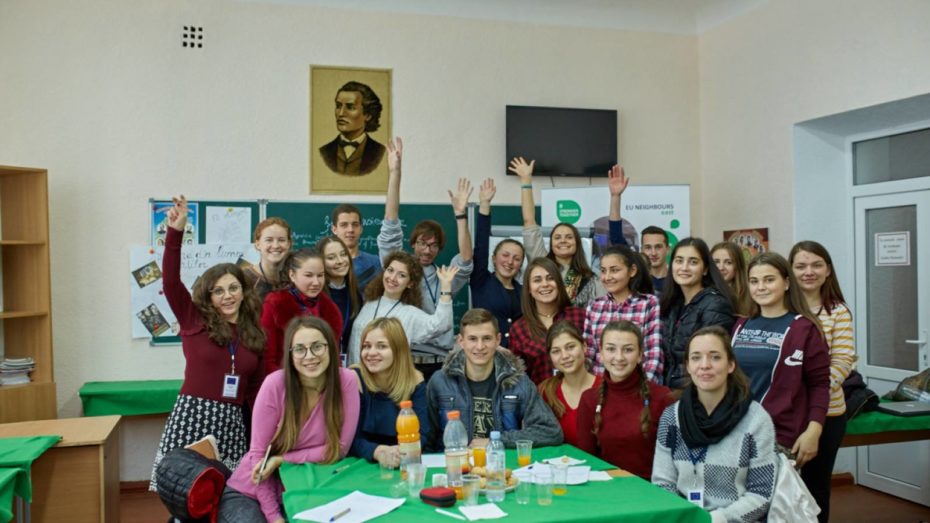
Photo source: personal archive
That idealistic, tenacious, even though sometimes hesitant teenager has grown up into a fine, active and successful young lady that never gave up on her old dreams. Today, Carolina is part of the active youth, with a sharp critical thinking and an intense desire to find out new things. And that means, for her, to get out of her comfort zone, to accept new challenges and to continuously grow.
“I’m a humanist in my heart and my mind, and I want to dedicate my further activity to this cause.”
About her studies
Being passionate about volunteering, youth policies and diplomacy, Carolina clearly knew in what direction she wanted to go. First, she graduated in European Studies from Babeș-Bolyai University in Cluj-Napoca, Romania. Then, she got her master’s degree in Security and Diplomacy at the National University of Political Studies and Public Administration in Bucharest. “From 2011 until now I have studied and lived in four European countries. Each of these experiences was unique and very useful. I became aware of the importance of education and professional development. Even though I took a study break, I’m not giving up on the desire to move forward, hoping to attend soon a PhD in London,” states Carolina.
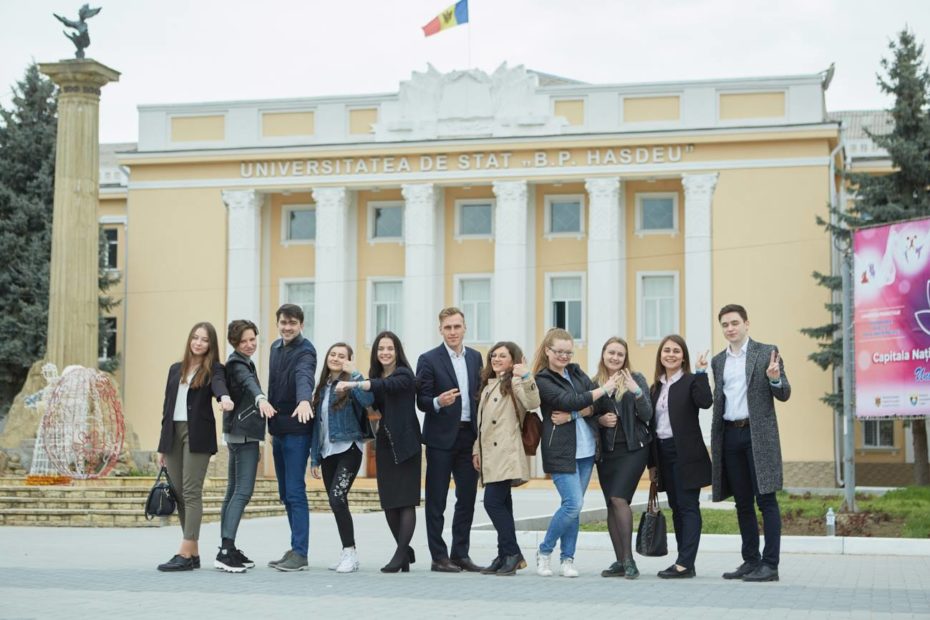
Photo source: personal archive
In addition to her studies in Romania, Carolina earned an Erasmus scholarship twice and went for exchange studies to Prague, Czech Republic and to Bonn, Germany. “Another key element was to discover the importance of cultural interaction. As a follower of tolerance, solidarity and of other European values, I plead for the positive impact of diversity, as I know how much it contributes to the social development and progress,” she adds.
About her job
When referring to the job she has, Carolina mentions that the European Union offers a lot of freedom combined with competitiveness, where one can’t make it without clearly set strategy and objectives. That’s what she did.
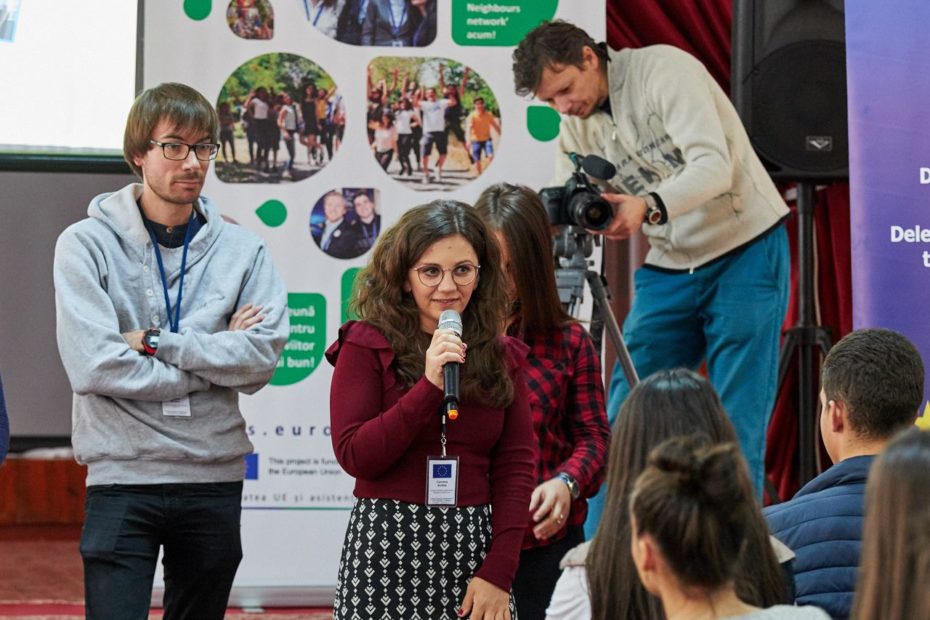
Photo source: personal archive
Carolina became a Young European Ambassador at the end of 2016. Since then, she has been involved in numerous projects, launched in the Eastern Partnership countries, as well as in the European Union. The projects were aimed at informing about the European education opportunities. “This experience combines two of my passions: involvement in youth policies, and the opportunity to advance in my job in the field of European studies, where I have graduated,” our protagonist mentions.
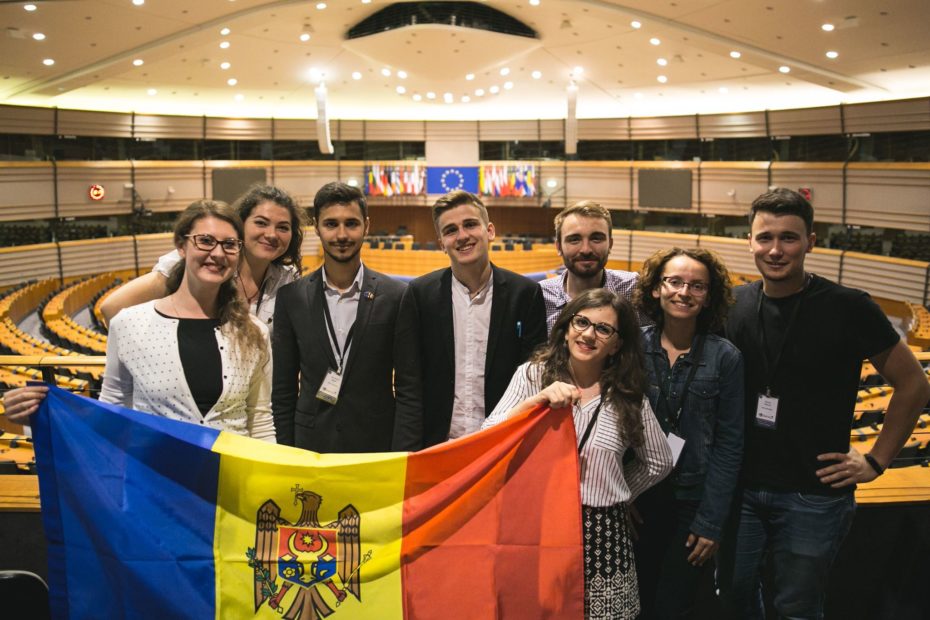
Photo source: personal archive
“I do not even imagine having an office job with a simple routine. It is possibly because we have always had continuous challenges, cultivating the spirit of non-formal education and engaging in various activities.”
Carolina’s mission, as a Young European Ambassador, involves explaining how the European Union has contributed to her personal development and encouraging young people to follow their dreams and passions by accessing opportunities offered by the EU. “I like the fact that we can contribute to the activities of our network and we can do it remotely as well, through the content on social networks and communication in the online environment,” Carolina reveals. The most rewarding about her job is that it takes her home. As she mentions: “in the period of 2017-2018 I visited Moldova within the project I work more than I did it in the period when I was a student in Cluj-Napoca and Bucharest.”
About Moldova
In one of the most multicultural environments one could be, Carolina’s mission extends to the way she spreads the word about her homeland. “The opinion about Moldova depends on the interaction with Moldovan people,” says Carolina, “but sometimes you have to be ready to combat the stereotypes, if necessary, and explain that some news or general facts do not represent the whole picture.”
As she lives in London at the moment, Carolina is proud to hear about Moldova from British people that have good friends in Moldova or know something about the Moldovan wines, sweets and hospitality.
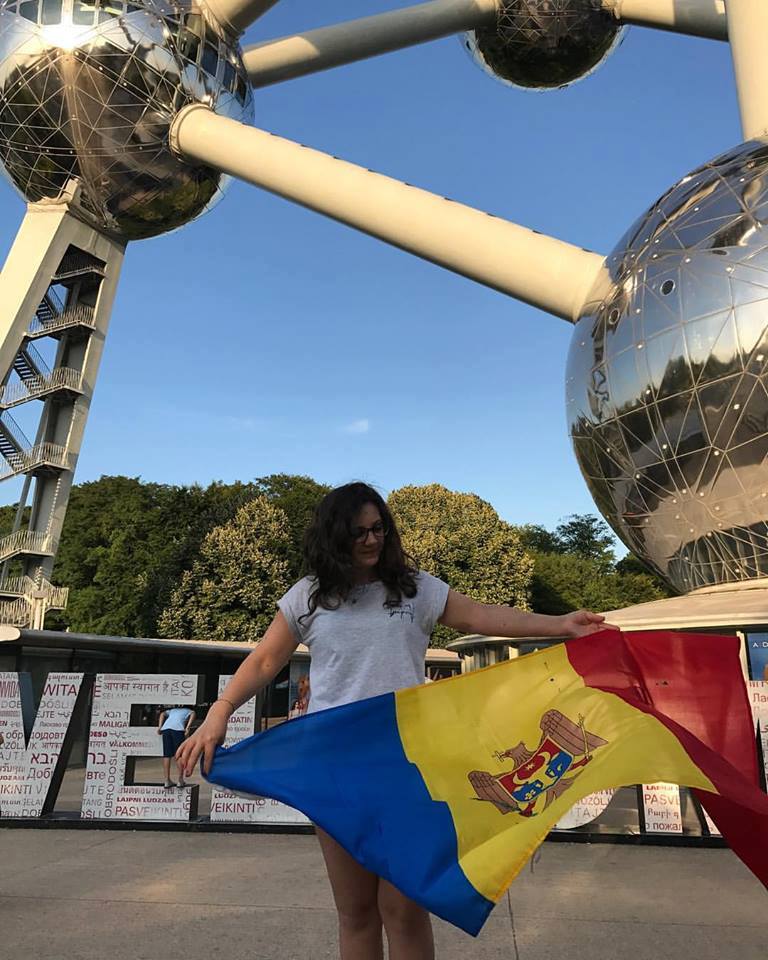
Photo source: personal archive
Carolina knows from her own experience how a young person that left Moldova can still contribute to the country’s development even being far from home. “During my studies in Cluj-Napoca, I was a member of an NGO for three years and promoted the involvement of students in the community formed there. While I was studying in Germany, I became a Young European Ambassador for the Republic of Moldova. My work included the promotion of our culture, the development of various social, economic or political projects and changing minds about Moldova,” highlights Carolina.
Thus, the protagonist of our today’s story is the person that found her own way of combining her passions with her job, and the need to return home and have an impact. We congratulate her for that.
Society
“They are not needy, but they need help”. How Moldovan volunteers try to create a safe environment for the Ukrainian refugees

At the Government’s ground floor, the phones ring constantly, the laptop screens never reach standby. In one corner of the room there is a logistics planning meeting, someone has a call on Zoom with partners and donors, someone else finally managed to take a cookie and make some coffee. Everyone is exhausted and have sleepy red eyes, but the volunteers still have a lot of energy and dedication to help in creating a safe place for the Ukrainian refugees.
“It’s like a continuous bustle just so you won’t read the news. You get home sometimes and you don’t have time for news, and that somehow helps. It’s a kind of solidarity and mutual support,” says Vlada Ciobanu, volunteer responsible for communication and fundraising.
The volunteers group was formed from the very first day of war. A Facebook page was created, where all types of messages immediately started to flow: “I offer accommodation”, “I want to help”, “I want to get involved”, “Where can I bring the products?”, “I have a car and I can go to the customs”. Soon, the authorities also started asking for volunteers’ support. Now they all work together, coordinate activities and try to find solutions to the most difficult problems.
Is accommodation needed for 10, 200 or 800 people? Do you need transportation to the customs? Does anyone want to deliver 3 tons of apples and does not know where? Do you need medicine or mobile toilets? All these questions require prompt answers and actions. Blankets, sheets, diapers, hygiene products, food, clothes – people bring everything, and someone needs to quickly find ways of delivering them to those who need them.
Sometimes this collaboration is difficult, involves a lot of bureaucracy, and it can be difficult to get answers on time. “Republic of Moldova has never faced such a large influx of refugees and, probably because nobody thought this could happen, a mechanism of this kind of crisis has not been developed. Due to the absence of such a mechanism that the state should have created, we, the volunteers, intervened and tried to help in a practical way for the spontaneous and on the sport solutions of the problems,” mentions Ecaterina Luțișina, volunteer responsible for the refugees’ accommodation.
Ana Maria Popa, one of the founders of the group “Help Ukrainians in Moldova/SOS Українці Молдовa” says that the toughest thing is to find time and have a clear mind in managing different procedures, although things still happen somehow naturally. Everyone is ready to intervene and help, to take on more responsibilities and to act immediately when needed. The biggest challenges arise when it is necessary to accommodate large families, people with special needs, for which alternative solutions must be identified.
Goods and donations
The volunteers try to cope with the high flow of requests for both accommodation and products of all kinds. “It came to me as a shock and a panic when I found out that both mothers who are now in Ukraine, as well as those who found refuge in our country are losing their milk because of stress. We are trying to fill an enormous need for milk powder, for which the demand is high and the stocks are decreasing”, says Steliana, the volunteer responsible for the distribution of goods from the donation centers.
Several centers have been set up to collect donations in all regions of Chisinau, and volunteers are redirecting the goods to where the refugees are. A system for processing and monitoring donations has already been established, while the volunteer drivers take over the order only according to a unique code.
Volunteers from the collection centers also do the inventory – the donated goods and the distributed goods. The rest is transported to Vatra deposit, from where it is distributed to the placement centers where more than 50 refugees are housed.
When they want to donate goods, but they don’t know what would be needed, people are urged to put themselves in the position of refugees and ask themselves what would they need most if they wake up overnight and have to hurriedly pack their bags and run away. Steliana wants to emphasise that “these people are not needy, but these people need help. They did not choose to end up in this situation.”
Furthermore, the volunteer Cristina Sîrbu seeks to identify producers and negotiate prices for products needed by refugees, thus mediating the procurement process for NGOs with which she collaborates, such as Caritas, World Children’s Fund, Polish Solidarity Fund, Lifting hands, Peace Corps and others.
One of the challenges she is facing now is the identifying a mattress manufacturer in the West, because the Moldovan mattress manufacturer that has been helping so far no longer has polyurethane, a raw material usually imported from Russia and Ukraine.
Cristina also needs to find solutions for the needs of the volunteer groups – phones, laptops, gsm connection and internet for a good carrying out of activities.
Hate messages
The most difficult thing for the communication team is to manage the hate messages on the social networks, which started to appear more often. “Even if there is some sort of dissatisfaction from the Ukrainian refugees and those who offer help, we live now in a very diverse society, there are different kind of people, and we act very differently under stress,” said Vlada Ciobanu.
Translation by Cătălina Bîrsanu
Important
#WorldForUkraine – a map that shows the magnitude of the world’s actions against Russian aggression

The international community and volunteers from all over te world have launched #WorldForUkraine as a platform that shows the magnitude of the world’s actions against the Russian aggression. In a digital world – it is an interactive map of public support of Ukrainians under the hashtag #WorldForUkraine – rallies, flash mobs, protests around the world. In the physical dimension – it is your opportunity to take to the streets and declare: “No to Putin’s aggression, no to war.”
„Today, along with the political and military support, emotional connection with the civilized world and truthful information are extremely important for Ukraine. The power to do it is in your hands. Join the #WorldForUkraine project and contribute to the victorious battle against the bloodshed inflicted on Ukraine by the aggression of the Russian Federation”, says the „about the project” section of the platform.
Go to the streets — Tell people — Connect and Unite — Become POWERFUL
Volunteers have launched #WorldForUkraine as a platform that shows the magnitude of the world’s actions against Russian aggression. In digital world – it is an INTERACTIVE MAP of public support of Ukrainians worldforukraine.net under the hashtag #WorldForUkraine – rallies, flash mobs, protests around the world. In the physical dimension – it is your opportunity to take to the streets and declare: “No to Putin’s aggression, no to war.” There you may find information about past and future rallies in your city in support of Ukraine. This is a permanent platform for Ukrainian diaspora and people all over the world concerned about the situation in Ukraine.
So here’s a couple of things you could do yourself to help:
* if there is a political rally in your city, then participate in it and write about it on social media with geolocation and the hashtag #WorldForUkraine
* if there are no rallies nearby, organize one in support of Ukraine yourself, write about it on social media with geolocation adding the hashtag #WorldForUkraine
The map will add information about gathering by #WorldForUkraine AUTOMATICALLY
Your voice now stronger THAN ever
All rallies are already here: https://worldforukraine.net
Important
How is Moldova managing the big influx of Ukrainian refugees? The authorities’ plan, explained

From 24th to 28th of February, 71 359 Ukrainian citizens entered the territory of Republic of Moldova. 33 173 of them left the country. As of this moment, there are 38 186 Ukrainian citizens in Moldova, who have arrived over the past 100 hours.
The Moldovan people and authorities have organized themselves quickly from the first day of war between Russia and Ukraine. However, in the event of a prolonged armed conflict and a continuous influx of Ukrainian refugees, the efforts and donations need to be efficiently managed. Thus, we inquired about Moldova’s long-term plan and the state’s capacity to receive, host, and treat a bigger number of refugees.
On February 26th, the Ministry of Labor and Social Protection of Moldova approved the Regulation of organization and functioning of the temporary Placement Center for refugees and the staffing and expenditure rules. According to the Regulation, the Centers will have the capacity of temporary hosting and feeding at least 20 persons, for a maximum of 3 months, with the possibility of extending this period. The Centers will also offer legal, social, psychological, and primary medical consultations to the refugees. The Center’s activity will be financed from budget allocations, under Article 19 of Provision no. 1 of the Exceptional Situations Commission from February 24th, 2022, and from other sources of funding that do not contravene applicable law.
The Ministry of Inner Affairs and the Government of Moldova facilitated the organization of the volunteers’ group “Moldova for Peace”. Its purpose is to receive, offer assistance and accommodation to the Ukrainian refugees. The group is still working on creating a structure, registering and contacting volunteers, etc. It does not activate under a legal umbrella.
Lilia Nenescu, one of the “Moldova for Peace” volunteers, said that the group consists of over 20 people. Other 1700 registered to volunteer by filling in this form, which is still available. The group consists of several departments:
The volunteers’ department. Its members act as fixers: they’re responsible for connecting the people in need of assistance with the appropriate department. Some of the volunteers are located in the customs points. “The Ministry of Inner Affairs sends us every day the list of the customs points where our assistance is needed, and we mobilize the volunteers”, says Lilia Nenescu.
The Goods Department manages all the goods donated by the Moldavian citizens. The donations are separated into categories: non-perishable foods and non-food supplies. The volunteers of this department sort the goods into packages to be distributed.
The Government intends to collect all the donations in four locations. The National Agency for Food Safety and the National Agency for Public Health will ensure mechanisms to confirm that all the deposited goods comply with safety and quality regulations.
The Service Department operates in 4 directions and needs the volunteer involvement of specialists in psychology, legal assistance (the majority of the refugees only have Ukrainian ID and birth certificates of their children); medical assistance; translation (a part of the refugees are not Ukrainian citizens).
According to Elena Mudrîi, the spokesperson of the Ministry of Health, so far there is no data about the number of Covid-19 positive refugees. She only mentioned two cases that needed outpatient medical assistance: a pregnant woman and the mother of a 4-day-old child.
The Accommodation Department. The volunteers are waiting for the centralized and updated information from the Ministry of Labor about the institutions offering accommodation, besides the houses offered by individuals.
The Transport Department consists of drivers organized in groups. They receive notifications about the number of people who need transportation from the customs points to the asylum centers for refugees.
The municipal authorities of Chișinău announced that the Ukrainian children refugees from the capital city will be enrolled in educational institutions. The authorities also intend to create Day-Care Centers for children, where they will be engaged in educational activities and will receive psychological assistance. Besides, the refugees from the municipal temporary accommodation centers receive individual and group counseling.
In addition to this effort, a group of volunteers consisting of Ana Gurău, Ana Popapa, and Andrei Lutenco developed, with the help of Cristian Coșneanu, the UArefugees platform, synchronized with the responses from this form. On the first day, 943 people offered their help using the form, and 110 people asked for help. According to Anna Gurău, the volunteers communicate with the Government in order to update the platform with the missing data.
Translation from Romanian by Natalia Graur


